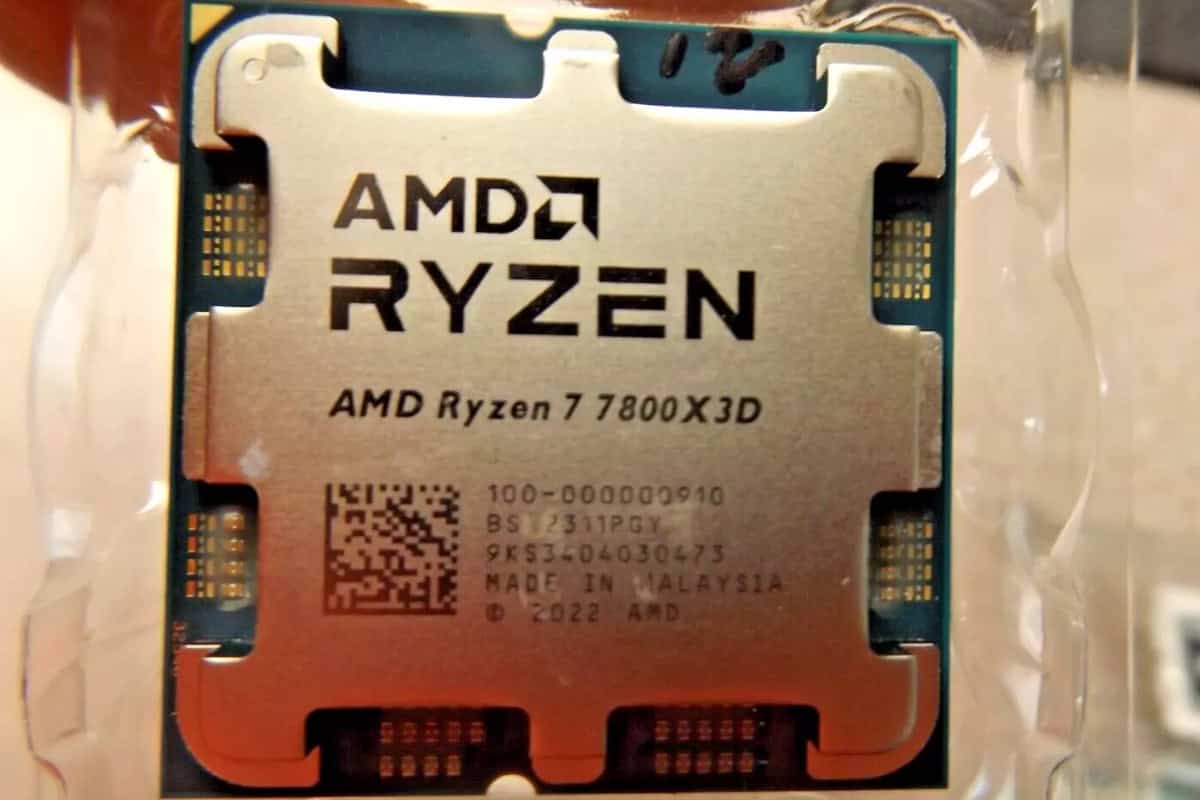Gaming CPUs play a big role in how well games run on your computer. They handle lots of tasks that make games look good and play smoothly. Picking the right CPU can make a big difference in your gaming experience.
For most gamers, the AMD 7800x3D is the best choice, and it’s not even close. If you want to go Intel look at the Intel Core i7-14700K, which is also a great choice. These CPUs offer strong performance without costing too much. They can run the latest games well and handle other tasks like streaming at the same time.
If you want the best gaming CPU for older generation builds, something like the AMD Ryzen 7 5800X3D is a top pick. It’s made to be really good at gaming. For those on a tighter budget, the AMD Ryzen 5 5600 or 5600G can still give you good gaming performance for less money.
Power Your Play: Choosing the Right CPU for Gaming
When it comes to gaming, the CPU (Central Processing Unit) plays a vital role in delivering smooth gameplay, fast loading times, and responsive performance. Not all CPUs are created equal, and understanding which ones excel in gaming and which might fall short can help you make an informed decision for your next PC build or upgrade.

Top Overall CPUs For 2025
| Rank | Name | Core Count | Performance Core Clock | Boost Clock | TDP | Price |
|---|---|---|---|---|---|---|
| 1 | AMD Ryzen 7 7800X3D | 8 | 4.2 GHz | 5 GHz | 120 W | $529.99 |
| 2 | AMD Ryzen 5 7600X | 6 | 4.7 GHz | 5.3 GHz | 105 W | $209.99 |
| 3 | AMD Ryzen 7 7700X | 8 | 4.5 GHz | 5.4 GHz | 105 W | $249.99 |
| 4 | AMD Ryzen 9 7950X3D | 16 | 4.2 GHz | 5.7 GHz | 120 W | $589.99 |
| 5 | Intel Core i7-14700K | 20 | 3.4 GHz | 5.6 GHz | 125 W | $389.99 |
| 6 | AMD Ryzen 7 9700X | 8 | 3.8 GHz | 5.5 GHz | 65 W | $329.99 |
| 7 | Intel Core i9-14900K | 24 | 3.2 GHz | 6 GHz | 125 W | $574.99 |
| 8 | AMD Ryzen 9 7900X | 12 | 4.7 GHz | 5.6 GHz | 170 W | $329.99 |
| 9 | AMD Ryzen 9 9950X | 16 | 4.3 GHz | 5.7 GHz | 170 W | $629.99 |
| 10 | AMD Ryzen 9 7900X3D | 12 | 4.4 GHz | 5.6 GHz | 120 W | $529.99 |
The Reigning Champion: AMD Ryzen 7 7800X3D
The overwhelming consensus from the community points towards the **AMD Ryzen 7 7800X3D** as the undisputed champion for gaming in 2024. Its 3D V-Cache technology gives it a significant edge in gaming performance, consistently delivering higher frame rates than its competitors in most titles. Users praise its ability to maximize gaming performance while maintaining a reasonable price point.
While the Ryzen 9 7950X3D offers a blend of gaming and productivity prowess, it doesn’t quite reach the same gaming heights as the 7800X3D. If your primary focus is pure gaming performance, the 7800X3D is the clear frontrunner. Its efficiency and ability to deliver impressive frame rates across a variety of games make it a top choice for gamers seeking the best possible experience.
Top-Tier Gaming CPUs

These CPUs are the heavy hitters, offering exceptional performance for even the most demanding games and multitasking scenarios:
| CPU | Cores/Threads | Clock Speed (Boost) | Socket | Strengths |
|---|---|---|---|---|
| Intel Core i9-14900K | 24/32 | Up to 6.0 GHz | LGA 1700 | Improved performance over 13th gen, excellent for multitasking and content creation. |
| AMD Ryzen 9 7950X3D | 16/32 | Up to 5.7 GHz | AM5 | Impressive gaming performance, strong multi-threaded capabilities. |
| Intel Core i7-14700K | 20/28 | Up to 5.6 GHz | LGA 1700 | Great balance of price and performance, suitable for high-end gaming. |
| AMD Ryzen 9 9900X | 12/24 | Up to 5.5 GHz | AM5 | Top performer with Zen 5 architecture, awaiting benchmarks |

Mid-Range Gaming CPUs
These CPUs offer a good balance of performance and affordability, making them suitable for most gamers:
| CPU | Cores/Threads | Clock Speed (Boost) | Socket | Strengths |
|---|---|---|---|---|
| Intel Core i5-14600K | 14/20 | Up to 5.3 GHz | LGA 1700 | Good for gaming and multitasking, competitive price point. |
| AMD Ryzen 5 7600X | 6/12 | Up to 5.3 GHz | AM5 | Excellent value for money, strong gaming performance. |
| AMD Ryzen 7 7700X | 8/16 | Up to 5.4 GHz | AM5 | Solid performance for both gaming and productivity tasks |
| AMD Ryzen 7 9700X | 8/16 | Up to 5.4 GHz | AM5 | Potential strong mid-range contender with Zen 5, awaiting benchmarks |
Budget-Friendly Gaming CPUs

If you’re on a tight budget, these CPUs can still deliver a decent gaming experience:
| CPU | Cores/Threads | Clock Speed (Boost) | Socket | Strengths |
|---|---|---|---|---|
| Intel Core i5-13400F | 10/16 | Up to 4.6 GHz | LGA 1700 | Affordable option, good for 1080p gaming and light multitasking. |
| AMD Ryzen 5 5600X | 6/12 | Up to 4.6 GHz | AM4 | Another solid budget choice, good for 1080p and some 1440p gaming. |
| AMD Ryzen 5 7600 | 6/12 | Up to 5.1 GHz | AM5 | Affordable entry into AM5 platform, good for 1080p gaming |

CPUs to Avoid for Gaming
While any CPU can technically run games, some are less suitable due to their lower core count, clock speeds, or outdated architecture:
- Low-end Intel Celeron and Pentium processors: These are designed for basic tasks and will struggle with modern games.
- Older AMD A-series APUs: While they offer integrated graphics, their CPU performance is often lacking for demanding games.
- CPUs with very low core counts (e.g., dual-core): Many modern games require at least 4 cores, and some benefit from even more.
Remember that your choice of CPU should also consider your GPU, RAM, and other components. A balanced system will ensure optimal performance and avoid bottlenecks. Always research and compare different CPUs before making a decision, and prioritize those that meet your gaming needs and budget. Keep an eye out for benchmarks and reviews of upcoming Zen 5 processors as they become available to make the most informed decision.
Why Intel 13th and 14th Gen CPUs Might Not Be the Best for Gaming Right Now
While Intel’s 13th and 14th generation CPUs offer impressive performance on paper, there are a few reasons why they might not be the optimal choice for gamers right now:
- Stability Concerns: Recent reports of instability and degradation issues with these chips, particularly when pushed to their limits, have raised concerns about their long-term reliability for demanding tasks like gaming.
- Price-to-Performance Ratio: Compared to their AMD Ryzen counterparts, particularly the 7800X3D with its superior gaming performance, Intel’s offerings can be less compelling in terms of value.
- Power Consumption and Heat: Intel’s chips are known to run hotter and consume more power than their AMD rivals, potentially leading to higher electricity bills and the need for beefier cooling solutions.
- Limited PCIe 5.0 Support: While some 13th and 14th gen motherboards offer PCIe 5.0 support, it’s not universal, limiting your options for future GPU upgrades that may leverage this technology.
In the current gaming landscape, where AMD’s Ryzen 7000 series, especially the 7800X3D, dominates in terms of price-to-performance and gaming benchmarks, Intel’s 13th and 14th gen CPUs face tough competition. Unless you specifically need Intel-exclusive features or are getting a particularly good deal, it might be wise to consider AMD’s offerings or wait for Intel’s next generation to address the current shortcomings.
Key Takeaways
- CPUs are key for smooth gameplay and good graphics
- Mid-range CPUs like Ryzen 7 7700 work well for most gamers
- High-end CPUs offer the best performance but cost more
Understanding Gaming CPU Fundamentals
Gaming CPUs need strong performance to run the latest games. They handle complex calculations and work with graphics cards to create smooth gameplay.
Core Count and Clock Speed
Modern gaming CPUs have multiple cores. More cores help run many tasks at once. Most games use 4-8 cores well. Clock speed is how fast a CPU works. Higher speeds mean faster processing.
Intel and AMD make CPUs with different core counts and speeds. The Intel Core i5-14600K has 14 cores and can reach 5.3 GHz. AMD’s Ryzen 7 7700 has 8 cores and goes up to 5.3 GHz. Both are good for gaming.
Faster clock speeds help most in games. But some newer games use more cores. This makes both speed and core count important.
CPU Architecture Evolution
CPU design keeps improving. New architectures bring better performance and features.
AMD’s Zen 4 design is in their latest Ryzen CPUs. It’s faster and more efficient than older versions. Intel’s Raptor Lake chips use a mix of performance and efficiency cores. This helps balance speed and power use.
3D V-Cache is a new AMD tech. It adds more cache memory to CPUs. This can boost game performance a lot. The Ryzen 7 5800X3D was the first gaming CPU with this feature.
Integration with GPUs
Some CPUs have built-in graphics. These are called APUs or integrated GPUs.
AMD’s Ryzen 5 5600G has decent integrated graphics. It can play many games without a separate graphics card. Intel’s newer CPUs also have improved integrated graphics.
For top performance, gamers still need a dedicated GPU. The CPU works with GPUs like the NVIDIA GeForce RTX 4090. Fast CPUs help prevent bottlenecks with high-end GPUs.
PCIe 5.0 is a new standard for connecting CPUs and GPUs. It allows faster data transfer between them. This can improve gaming performance in some cases.






